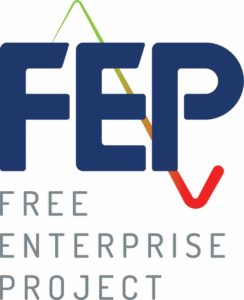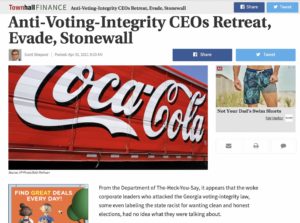
27 May 2021 CEOs Lack Integrity When Opposing Election Integrity
Georgia’s voter integrity law is being dragged through the mud by the left.
To be clear, protecting the electoral process from potential fraud is not racist. Yet leftist activists have co-opted hundreds of American companies to join them in an assault on this law and similar protections offered and enacted nationwide.
The National Center’s Free Enterprise Project (FEP) is pushing back against this effort – and getting results.
 In a Townhall commentary, FEP Deputy Director Scott Shepard chronicles how FEP’s shareholder activists have challenged this “hasty, thoughtless opposition” at four recent corporate investor meetings.
In a Townhall commentary, FEP Deputy Director Scott Shepard chronicles how FEP’s shareholder activists have challenged this “hasty, thoughtless opposition” at four recent corporate investor meetings.
At Coca-Cola, “CEO James Quincey backpedaled from the company’s opposition to the law, instead simply offering pablum about wanting open access to elections.”
Scott responds:
Well, yes, Jim, everybody does. Open access for each adult to cast one ballot – with no 3 a.m. boxes of magical ballots. It’s pretty clear that you’re now fully aware that the Georgia law is not, as you earlier asserted, “unacceptable, it is a step backward and it does not promote principles we have stood for in Georgia,” including “ensuring election integrity.” But now you owe the people of Georgia an apology for defaming them. When can we look for that?
At the Bank of America (BoA) shareholder meeting:
CEO Brian Moynihan… [was] specifically asked when Bank of America was going to stop requiring IDs to borrow money, enter their facilities, vote at their shareholder meetings, and the like. Moynihan retreated, squirmed, evaded. He said that BoA does not oppose voter ID, a detail he’s excluded from his denunciations of the Georgia law. He then backed off those denunciations entirely, admitting that the law was – gosh golly – more complicated than he’d bothered to discover before stirring up civic strife with his virtue-signaling opposition. Finally, he called for the convening of a “bipartisan commission” to study how to make elections reliable and trusted.
 FEP witnessed even more surprising results when confronting drugmaker Pfizer:
FEP witnessed even more surprising results when confronting drugmaker Pfizer:
Pfizer CEO Albert Bourla retreated entirely from the company’s previous opposition to the Georgia law. “We are not taking a position on specifics, on specific laws,” he, um, clarified. By its previous opposition, Pfizer really just meant to “stat[e] our basic principle that access to vote is very important for the democracy.”
At least one CEO tried to stick to his guns – even if he was unable to adequately defend his beliefs:
Chip Bergh, the CEO of Levi Strauss, doubled down on calling the Georgia law, and other voting-integrity efforts across the country, racist. But he explicitly said that voter ID isn’t racist or wrong, and he couldn’t identify any specific provisions that he thought were racist. Chip, have you swallowed so much critical theory that you think that citizens demanding that elections not be stolen is racist? Or does virtue signaling and libel wholly outweigh truth for you?
Scott draws a few conclusions from FEP’s activism and ends with a call to action:
The lessons last week: first, corporate virtue-signaling is not thoughtful or good-faith. It is biased and ill-considered nonsense. This episode provides one example, but it’s shot straight through companies’ woke “stakeholder capitalism” stances. Corporate executives have no qualifications to control our lives as self-appointed policy czars. They’re stirring up social strife and civic collapse for narrow personal benefit.
Second: intense scrutiny and heavy pressure from the sensible center/right of this country is effective. Let’s amp it up.
Woke CEOs “have to be watched, confronted and stopped,” Scott concludes. “Before things get worse.”
Read all of Scott’s Townhall commentary – “Anti-Voting-Integrity CEOs Retreat, Evade, Stonewall” – by clicking here. And learn more about FEP’s activism on election integrity and other issues by clicking here.




